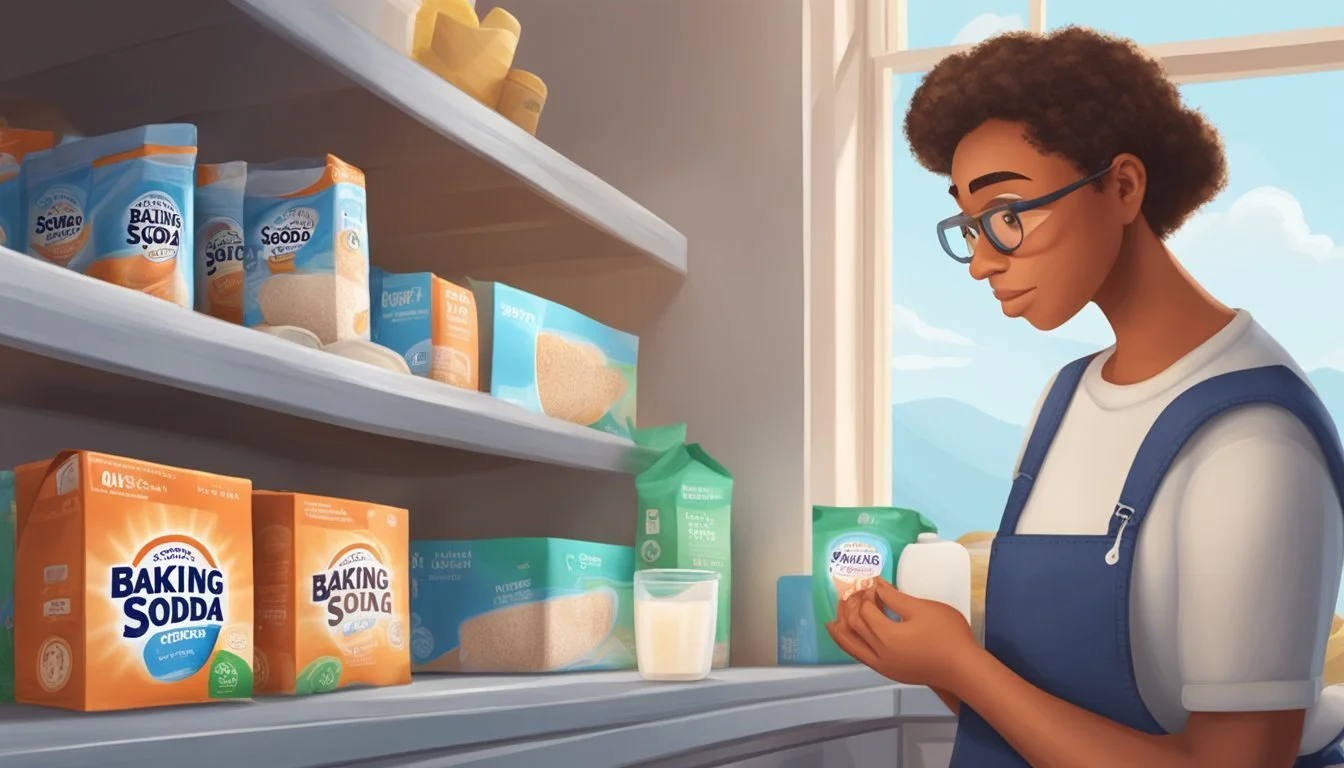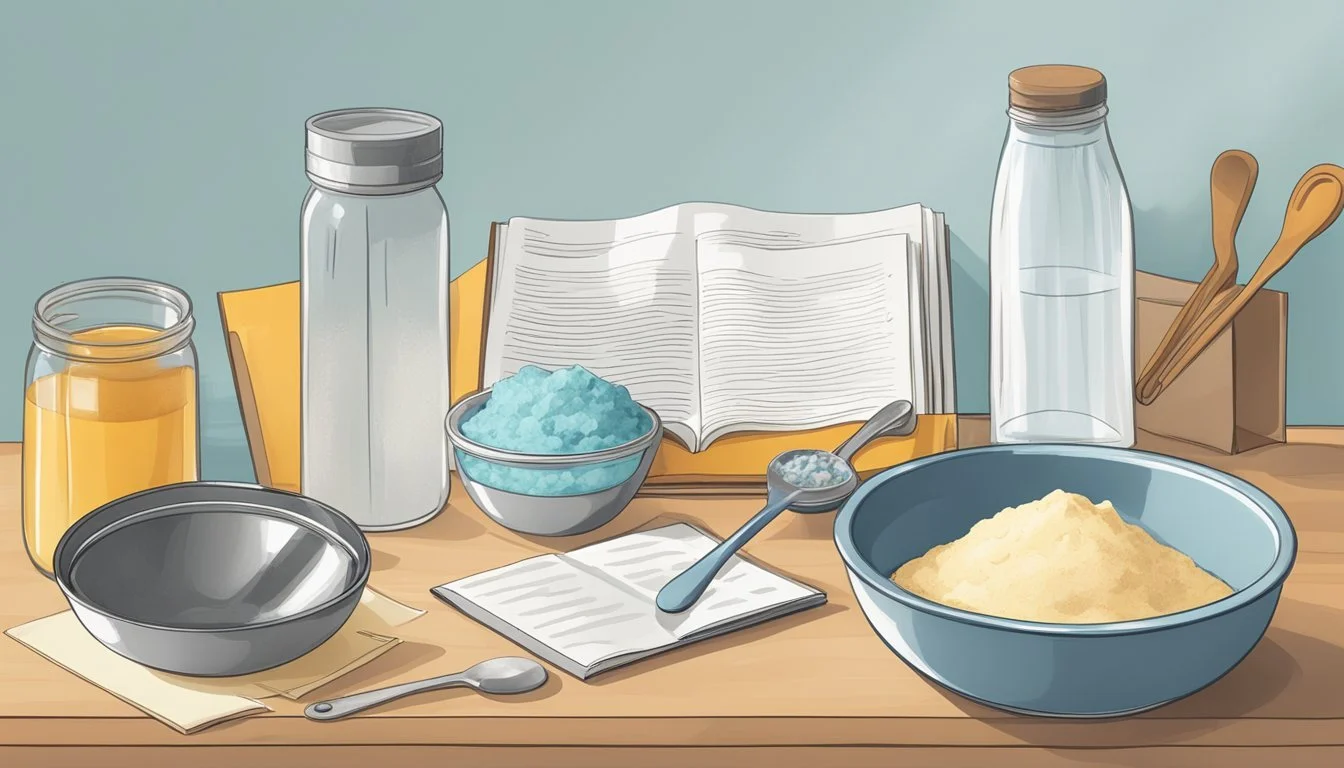Is it Safe to Use Expired Baking Soda?
Assessing Potential Risks and Efficacy
When considering the safety and effectiveness of kitchen staples, baking soda is often a point of discussion due to its widespread use and long shelf life. Baking soda, also known as sodium bicarbonate, is a key ingredient in baking that reacts with acidic components to release carbon dioxide gas, which in turn helps baked goods rise. While it's generally safe to use expired baking soda, its leavening power may weaken over time. The expiration date provided by manufacturers serves as a guideline for when the product is likely to retain optimal quality.
It is common to wonder what happens if one inadvertently uses baking soda past its prime. The primary concern is not safety-related but performance-based, as aged baking soda may not produce the desired effect in baking recipes. Testing the potency of baking soda is simple: a mixture of baking soda and an acidic liquid should fizz immediately and vigorously if the baking soda is still active. If the reaction is lackluster, it indicates that the baking soda has lost its leavening properties and should be replaced.
Understanding Baking Soda
Baking soda, also known as sodium bicarbonate, is a versatile pantry staple prized for its leavening properties in cooking and baking. This section breaks down its composition, differentiates it from baking powder, discusses its shelf life and potency, and offers storage recommendations.
Composition and Chemical Properties
Baking soda consists of sodium, hydrogen, carbon, and oxygen — a composition that enables it to act as a leavening agent when mixed with an acidic ingredient. This combination leads to a chemical reaction that produces carbon dioxide gas, causing dough or batter to rise.
Baking Soda vs Baking Powder
While both baking soda and baking powder are used for leavening, they differ substantially. Baking soda is pure sodium bicarbonate, whereas baking powder includes sodium bicarbonate along with acidifying agents such as cream of tartar and drying agents like starch. Baking soda requires an additional acidic ingredient to activate it, while baking powder only requires moisture.
Shelf Life and Potency
The shelf life of baking soda is typically 2-3 years unopened and about 6 months once opened if stored properly. Expired baking soda may not be harmful, but it can lose potency over time, compromising its leavening properties.
Test for Potency: Drop a teaspoon of baking soda into a mixture of vinegar and water; bubbling indicates it remains active.
Storage Recommendations
To retain its quality, store baking soda in a sealed container away from moisture and odors. A dry pantry or cupboard is ideal. Using an airtight container can extend its potency beyond the expiration date marked on the packaging.
Evaluating Baking Soda's Safety and Effectiveness
When baking soda surpasses its expiration date, its potency for culinary applications can lessen, although generally it remains safe for consumption. Consumers can perform a simple test to evaluate its effectiveness.
Signs of Expired Baking Soda
Expired baking soda may not necessarily change in appearance, but its capability to provoke a chemical reaction diminishes over time. This efficacy can compromise the intended rise in baked goods, affecting both texture and flavor.
Health Risks of Using Expired Baking Soda
Health risks from using expired baking soda are minimal, as the compound remains chemically stable even after its expiration date. It is considered safe to use in baking despite a potential decrease in leavening power.
Impact on Baking Quality
An expired baking soda's compromised leavening capacity can directly affect the quality of baked goods. Products like cakes or bread may not rise sufficiently, leading to a denser texture that could diverge from the desired outcome of the recipe.
Determining Baking Soda's Effectiveness
A simple test using vinegar can establish whether baking soda is still effective. Mix a quarter teaspoon of baking soda with a few drops of vinegar; an immediate fizzing reaction indicates it can still cause dough to rise and bubbles to form. If it does not bubble or fizz, its effectiveness for baking is likely inadequate.
Practical Uses and Considerations
When it comes to expired baking soda, its effectiveness can diminish, but it can still serve various practical uses in and out of the kitchen, from cooking and baking to cleaning and deodorizing.
Baking Soda for Cooking and Baking
Baking soda acts as a leavening agent in recipes, which is crucial for making baked goods rise. Expired baking soda may have lost some of its potency, meaning it might not cause the same degree of leavening as fresh baking soda. To test its effectiveness, one can conduct a simple test by adding a few drops of vinegar to a small amount of baking soda; if it bubbles vigorously, it's still effective. In cooking, even less effective baking soda can still neutralize acidity, often added to tomato sauce or to balance the flavors in a dish.
Baking Soda in Cleaning and Deodorizing
In cleaning, expired baking soda still retains scrubbing and deodorizing properties. It can deal with grease stains, stubborn stains, and general cleaning tasks, though perhaps not as effectively as fresh supplies.
Cleaning: Safe for use on many surfaces, combine with water to form a paste for scrubbing.
Deodorizing: To deodorize a fridge, an open container can absorb odors without needing to rely on its full chemical potency.
Alternative Uses for Expired Baking Soda
Even beyond its best-by date, expired baking soda has alternative uses. It can be added to a laundry load to boost detergent performance or mixed with water to create a gentle hair cleanser. While effectiveness may be reduced, practical uses are still plentiful, underlining the versatility of this pantry staple. It is important, however, to recognize that replacements or alternatives may be more suitable when baking soda's efficacy is instrumental to the task at hand.
Expiration Date vs Best By Date
Understanding the difference between 'expiration date' and 'best by date' is crucial when assessing the usability of baking soda, a common kitchen staple.
Interpreting Expiration Labels
Expiration Date: This is the date after which a product is not recommended for use, as it may no longer be safe or effective. It is commonly used for highly perishable items where safety is a concern, such as medications and infant formula.
Best By Date: Contrary to an expiration date, a 'best by date' serves as a guideline for when the product should be used to enjoy its optimal quality. It is not a safety-related date but rather an indicator of when the product may begin to decrease in potency or flavor.
How Long Does Baking Soda Last?
The longevity of baking soda can vary:
Unopened: Baking soda can last for a fairly prolonged period when it's unopened — typically 2 to 3 years.
Opened: Once opened, its potency might reduce, but it often remains useful for baking for up to 6 months.
Baking soda's shelf life can extend beyond these timeframes if it's stored properly, but its effectiveness in recipes could diminish, making the dough less likely to rise. A simple test to check whether baking soda is stale or fresh involves adding an acidic substance like vinegar; a heavy fizz indicates it's still active.
Tips on Handling Expired Baking Soda
When handling expired baking soda, it's important to determine its remaining efficacy, explore effective alternatives, and know the proper disposal methods.
Testing Expired Baking Soda
Before deciding whether to use expired baking soda, perform a simple test to check for its potency. Mix a small amount of baking soda with a few drops of an acidic substance, such as vinegar or lemon juice. If it produces a vigorous fizz, the baking soda still has cleaning and deodorizing effectiveness. Lack of reaction suggests it's time to replace it.
Effective Alternatives to Baking Soda
If expired baking soda is not producing the desired fizz in testing, consider alternatives that may be available in your household:
Lemon juice: Ideal for removing stains and odors, and can have a mild bleaching effect.
Vinegar: A versatile acidic agent that can be used for various cleaning purposes, including unclogging drains when combined with hot water.
Disposal of Expired Baking Soda
Expired baking soda can be safely disposed of without harming the environment. An eco-friendly approach is to pour it down the drain with hot water, which may help in unclogging and deodorizing the pipes. However, if large quantities are involved, consult your local waste management guidelines to ensure proper disposal.
Frequently Asked Questions
When considering the use of expired baking soda, it's important to understand its effectiveness for specific purposes, the best storage practices to maintain freshness, and how environmental factors such as heat impact its potency. Here are some of the most commonly asked questions:
Can You Use Expired Baking Soda for Heartburn?
Expired baking soda, while less potent, can still offer relief for heartburn. It neutralizes stomach acid, which is the immediate cause of the discomfort. However, one should ensure that it still produces bubbles when mixed with an acid like vinegar or lemon juice, indicating that it retains some efficacy.
Does Freezer Storage Extend Freshness?
Yes, storing baking soda in the freezer can help extend its shelf life. Placing it in a sealed container protects it from moisture and odors, which are factors that can degrade its quality over time. Still, even well-stored baking soda will eventually lose its effectiveness.
Can Heat Affect Baking Soda's Potency?
Exposure to heat can indeed affect the potency of baking soda. High temperatures, like those near an oven, might cause baking soda to prematurely react and lose its leavening power. To preserve its potency, one should store baking soda in a cool, dry place away from sources of heat.
Conclusion
Using expired baking soda is generally considered safe but may not be effective. Baking soda's potency as a leavening agent decreases over time, which can result in baked goods not rising as expected. A simple test for efficacy involves combining baking soda with an acidic liquid like vinegar or lemon juice – a strong, immediate fizz indicates it's still active.
For consumption:
Safe: Yes, but with potential for reduced performance
Taste and Odor: Possible degradation over time
For cleaning:
Effective: Yes, though effectiveness can diminish
Shelf Life: Up to 6 months after opening for optimal results
Storage to ensure longevity includes:
Keeping baking soda in a cool, dry place.
Sealing the package tightly after use.
In summary, while there are no significant safety concerns associated with using expired baking soda, its leavening and cleaning powers may be lessened. It is recommended to replace baking soda based on the expiration date provided by the manufacturer or to conduct a simple test to check for its efficacy before use.



